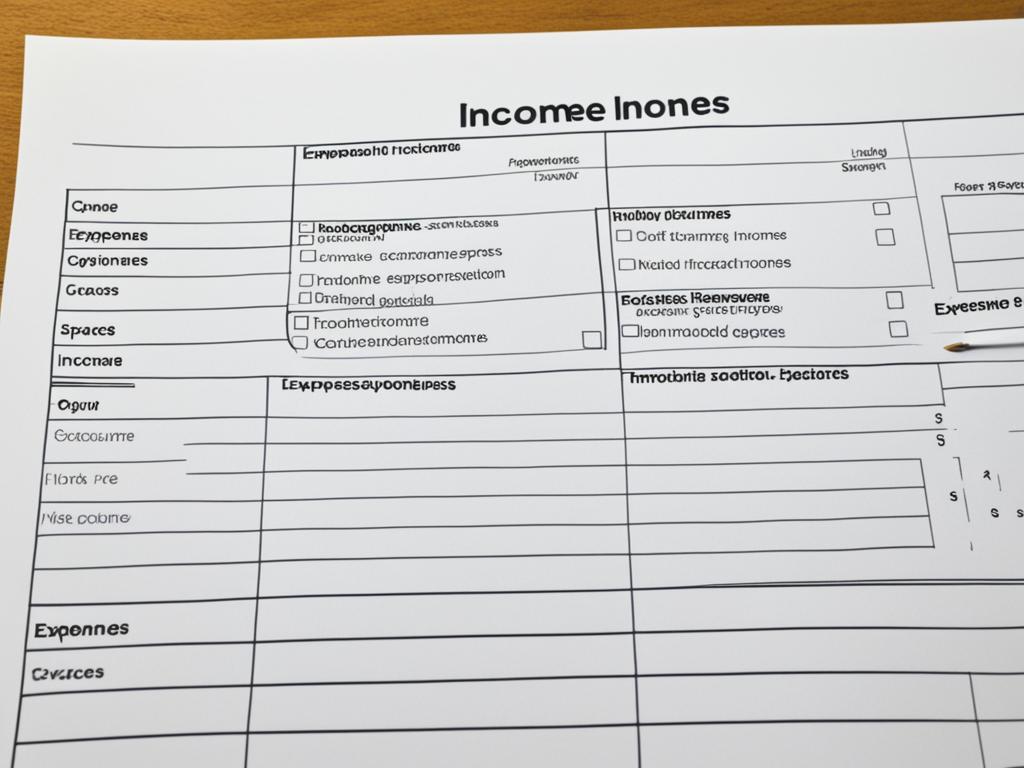Did you know that only 40% of Americans are financially prepared for unexpected expenses?
Empowering yourself financially is crucial for long-term stability and success. By implementing smart finance tips, you can effectively manage your personal finances, plan for the future, and make informed investment decisions. In this article, we will explore various strategies and techniques to help you achieve financial empowerment.
Key Takeaways:
- Setting clear and specific financial goals is the first step towards financial empowerment.
- Making a budget helps prioritize spending and track expenses.
- Building an emergency fund provides financial security.
- Paying off debt reduces financial burdens.
- Timely bill payments maintain a good credit score.
Setting Financial Goals
Setting clear and specific financial goals is the first step towards achieving financial empowerment. When it comes to setting your goals, it’s important to follow the SMART framework. SMART stands for Specific, Measurable, Achievable, Relevant, and Time-bound. By incorporating these elements into your goals, you can create a roadmap for your financial journey and increase your chances of success.
Specific: Your financial goals should be well-defined and specific. Instead of saying, “I want to save money,” specify the amount you want to save and the timeline you want to achieve it within. For example, “I want to save $10,000 for a down payment on a house within the next two years.”
Measurable: Your financial goals should be measurable, meaning you should be able to track your progress. Set measurable milestones along the way to help you stay motivated and gauge your progress. For instance, if your long-term goal is to save $100,000 for retirement in 10 years, you can set yearly targets to save $10,000 each year.
Achievable: While it’s important to challenge yourself, ensure that your goals are realistic and attainable. Consider your current financial situation, income, and expenses when setting your goals. Setting unachievable goals can lead to frustration and demotivation. Start with smaller goals and gradually increase the difficulty as you progress.
Relevant: Your financial goals should align with your values, priorities, and long-term objectives. Make sure they are relevant to your overall financial plan. For example, if you’re focused on paying off high-interest debt, it may not be the right time to set a goal of purchasing a luxury car.
Time-bound: Setting a timeline for your financial goals helps create a sense of urgency and provides a deadline for you to work towards. It also helps you break down your goals into manageable steps. Determine the timeframe in which you want to achieve each goal, whether it’s short-term (within a year) or long-term (5+ years).
By following the SMART approach, you can set financial goals that are realistic, actionable, and meaningful. These goals will provide you with a clear sense of direction and motivation as you work towards achieving financial empowerment.
“The future belongs to those who believe in the beauty of their dreams.” – Eleanor Roosevelt

Example of Setting SMART Financial Goals:
| Goal | Specific | Measurable | Achievable | Relevant | Time-bound |
|---|---|---|---|---|---|
| Emergency Fund | Save $5,000 for emergencies | Track progress monthly | Save $100 per month for 50 months | Relevant for financial security | Goal achieved in 4 years |
| Debt Repayment | Pay off $10,000 credit card debt | Track progress monthly | Pay $500 per month for 20 months | Relevant for financial freedom | Goal achieved in 1.5 years |
| Education Savings | Save $20,000 for child’s education | Track progress annually | Save $2,000 per year for 10 years | Relevant for child’s future | Goal achieved in 10 years |
Creating a Budget
Making a budget is an essential component of effective financial management. It provides a structured approach to managing your money and allows you to take control of your finances. By creating a budget, you can prioritize your spending, track your expenses, and ensure that you are on track to achieve your financial goals.
One useful tool for creating a budget is a budget worksheet. This worksheet acts as a roadmap for your financial journey, helping you allocate funds to different categories and monitor your spending. It allows you to see a clear breakdown of your income, expenses, and savings, providing you with an accurate picture of your financial situation.
Using Budgeting Apps for Real-Time Tracking
Another convenient way to manage your budget is by utilizing budgeting apps. These apps are designed to simplify the budgeting process by automatically tracking your income and expenses, categorizing transactions, and providing insights into your spending habits.
With budgeting apps, you can conveniently monitor your cash flow in real-time, identify areas where you are overspending, and make necessary adjustments to stay within your budget. Some popular budgeting apps include Mint, YNAB (You Need a Budget), and Personal Capital.

Benefits of Budgeting
“A budget is a crucial tool for managing your money effectively. It allows you to make informed decisions about your finances and ensures that your spending aligns with your financial goals.”
By creating a budget and actively managing your finances, you can experience several benefits:
- Financial Control: A budget gives you control over your money and helps you make intentional spending decisions.
- Debt Reduction: By tracking your expenses, you can identify areas where you can cut back and allocate more money towards debt repayment.
- Savings Growth: Budgeting allows you to allocate funds towards savings, helping you build an emergency fund and work towards long-term financial goals.
- Goal Achievement: With a well-defined budget, you can align your spending with your financial goals, whether it’s saving for a down payment on a house, starting a business, or planning for retirement.
By implementing a budgeting system that works for you, whether it’s using a budget worksheet or a budgeting app, you can take control of your finances and pave the way for financial success.
Sample Monthly Budget
| Category | Budgeted Amount | Actual Amount |
|---|---|---|
| Housing | $1,200 | $1,150 |
| Transportation | $400 | $420 |
| Groceries | $300 | $320 |
| Utilities | $150 | $140 |
| Entertainment | $200 | $180 |
| Savings | $500 | $550 |
| Debt Repayment | $250 | $250 |
| Miscellaneous | $200 | $220 |
| Total | $3,200 | $3,370 |
Tracking your actual expenses against the budgeted amounts can help you identify areas where you may be overspending and make adjustments accordingly. It provides a visual representation of your financial progress and allows you to make informed decisions about your spending habits.
Building an Emergency Fund
An emergency fund is a financial safety net that provides peace of mind and protects you from unexpected expenses. It’s a pool of cash that you can rely on during challenging times, such as job loss, medical emergencies, or major repairs. Having an emergency fund in place can help you avoid going into debt and maintain financial stability.
When building an emergency fund, aim to save at least 3 to 6 months’ worth of living expenses. This amount may vary depending on your personal circumstances and risk tolerance. Calculate your average monthly expenses, including rent/mortgage, utilities, groceries, transportation, and any other essential costs. Multiply this figure by the number of months you want to cover, and you’ll have your target savings goal.
To keep your emergency fund separate from your regular savings, open a dedicated savings account. This account should be easily accessible but separate from your day-to-day banking to avoid temptation and ensure the money is available when needed. Look for a savings account with competitive interest rates and minimal fees.
One effective way to consistently contribute to your emergency fund is by setting up automatic deposits. Talk to your employer or your bank to automate regular deposits directly from your paycheck into your emergency savings account. This ensures that a portion of your income goes directly towards your fund without any effort on your part.

Paying Off Debt
Paying off debt is a fundamental step towards achieving financial empowerment. By taking control of your debt, you can pave the way for a more secure financial future. Here, we’ll explore effective strategies to manage and repay your debt, ultimately helping you become debt-free sooner.
Prioritize High-Interest Debt
When it comes to debt repayment, it’s essential to prioritize high-interest debt. Start by identifying loans or credit cards with the highest interest rates. By focusing on these debts first, you minimize interest charges and speed up your repayment progress. Make a list of your debts, including the interest rates, to keep track of your repayment priorities.
Make Larger Payments
Accelerate your debt repayment process by making larger payments whenever possible. Allocate extra funds towards your debt to reduce the principal amount faster. This approach not only decreases the overall interest paid but also helps you become debt-free ahead of schedule. Look for opportunities to increase your income or cut down on expenses, allowing you to make more significant contributions towards paying off your debt.
Incorporate Debt Repayment into Your Budget
An effective budget is a powerful tool for managing debt repayment. Incorporate debt repayment as a priority in your budget and allocate a specific portion of your income towards it. By treating debt repayment as a fixed expense, you ensure consistent progress towards becoming debt-free. Adjust your spending habits and lifestyle choices to free up additional funds for debt repayment, making it a top financial priority.
Pay More Than the Minimum Balance on Credit Card Bills
When dealing with credit card debt, paying only the minimum balance can keep you trapped in a cycle of debt for years. Aim to pay more than the minimum balance on your credit card bills to reduce the outstanding balance faster. By making larger payments, you not only save on interest but also improve your credit utilization ratio, positively impacting your credit score. Check your credit card statement to see how much you need to pay above the minimum balance to make a more significant impact on your debt repayment journey.

Remember, paying off debt requires discipline and commitment. With a solid plan in place and by applying these strategies, you can overcome your debt and achieve financial freedom.
Managing Bills and Timely Payments
| Managing Bills and Timely Payments |
|---|
 |
Paying bills on time is crucial for maintaining a good credit score and avoiding unnecessary late fees. Late payments can have a negative impact on your credit history and may result in higher interest rates for future loans or credit cards. To ensure timely bill payments, consider the following strategies:
- Create a bill payment calendar: Keep track of all your bills and their due dates by creating a calendar specifically for bill payments. Whether it’s a physical calendar or a digital one, having a visual reminder will help you stay organized.
- Enroll in automatic bill payment: Set up automatic payments for bills that are the same amount each month, such as utilities or subscription services. This will save you time and effort, and it reduces the risk of forgetting to pay a bill on time.
- Negotiate due dates: If your bill due dates don’t align with your payday, consider contacting your bill providers to negotiate a more convenient due date. This can help you avoid financial constraints and ensure that you have enough funds to cover your bills.
By implementing these strategies, you can stay on top of your bills and avoid the stress of late payments. Remember, timely bill payments not only protect your credit score but also contribute to your overall financial well-being.
Saving for Retirement
Planning for retirement is a critical part of achieving long-term financial stability. To ensure a comfortable and secure retirement, it is essential to take advantage of retirement plans offered by employers, such as 401(k) or IRA accounts. By contributing consistently to these retirement plans, you can build a nest egg that will support you during your golden years.
One of the significant advantages of employer-sponsored retirement plans is the potential for employer matching contributions. This means that for every dollar you contribute to your retirement account, your employer will also contribute a certain percentage, typically up to a specified limit. This matching contribution is essentially free money that can significantly boost the growth of your retirement savings.

It’s crucial to start saving for retirement as early as possible to maximize the benefits of compound interest. Compound interest allows your savings to grow exponentially over time, as you earn interest not only on your initial contributions but also on the accumulated interest. By starting early, you give your retirement savings more time to grow, potentially resulting in a larger nest egg when you retire.
To help illustrate the power of compound interest, consider the following example:
| Scenario | Contributions | Total Savings |
|---|---|---|
| Starting at age 25 | $300 per month | $694,646 |
| Starting at age 35 | $300 per month | $343,294 |
| Starting at age 45 | $300 per month | $165,641 |
This table demonstrates how starting to save for retirement ten years earlier can result in a significantly higher total savings amount. The power of compound interest allows individuals who start early to accumulate a larger retirement fund even if they contribute the same amount each month.
By making retirement planning a priority and taking advantage of employer-sponsored retirement plans, you can lay the foundation for a financially secure retirement. Begin saving as early as possible and contribute consistently to leverage the benefits of compound interest. Your future self will thank you for prioritizing your retirement savings.
Investing for Growth
Investing is an effective way to grow your wealth over time. By strategically allocating your funds, you can potentially earn higher returns than traditional savings accounts. However, it’s essential to choose investment strategies that align with your risk tolerance and financial goals.
One popular investment avenue is the stock market. Stocks represent ownership in a company and can offer significant growth potential. However, they also come with inherent risks as their value can fluctuate based on market conditions. It’s crucial to conduct thorough research and stay updated on market trends before making any investment decisions.
Exploring Different Investment Strategies
There are various investment strategies that you can consider based on your investment objectives. Some common strategies include:
- Value Investing: This strategy involves identifying undervalued stocks and investing in them with the expectation that their value will increase over time.
- Growth Investing: With this strategy, you focus on investing in companies that have strong growth potential. These companies may allocate their resources towards expansion, innovation, and market domination.
- Dividend Investing: Dividend investing pays emphasis on stocks that regularly pay dividends, providing a steady stream of income to investors.
- Index Investing: This strategy involves investing in an index fund that mirrors a specific market index, such as the S&P 500. It provides broad exposure to the overall performance of the market.
Remember, each investment strategy carries its own benefits and risks. It’s crucial to diversify your investment portfolio to mitigate risk and potentially maximize returns.
The Importance of Diversification
Diversification is a fundamental principle of investment management. It involves spreading your investment across different asset classes, sectors, and geographic regions to reduce the impact of a single investment’s performance on your overall portfolio.
By diversifying your investments, you can potentially achieve a balance between risk and reward. If one investment performs poorly, the positive performance of other investments can help offset the losses. This strategy can help protect your portfolio from severe downturns and increase the likelihood of long-term growth.
Consulting with a financial advisor can provide valuable insights into suitable investment strategies and optimal diversification techniques based on your unique financial situation and goals. They can offer guidance on asset allocation, risk management, and adjusting your investment portfolio as needed.

Planning for Financial Success
Financial success is a journey that requires continuous learning and strategic planning. By equipping yourself with the right financial education and resources, implementing effective financial planning strategies, and managing your credit wisely, you can pave the way for a successful financial future.
Educate Yourself
Obtaining financial education is key to making informed decisions and achieving your financial goals. Take advantage of various resources available, such as books, blogs, podcasts, or videos, to expand your knowledge on personal finance topics. Learn about budgeting, investing, debt management, and other aspects of financial literacy to empower yourself with the necessary skills for financial success.
Utilize Financial Resources
There is a wealth of free financial resources available online that can provide valuable insights and guidance. Access reputable websites, government resources, and financial institutions’ educational materials to enhance your financial knowledge. These resources can offer expert advice, calculators, budgeting tools, and step-by-step guides to help you make informed decisions and strengthen your financial position.
Develop Good Credit Management Habits
Managing your credit effectively is crucial for financial success. Develop good credit management habits by paying your bills on time, keeping credit card balances low, and avoiding unnecessary debt. Regularly review your credit reports to ensure their accuracy and address any errors promptly. Maintaining a good credit score opens up opportunities for favorable loan terms, lower interest rates, and increased financial stability.
Benefits of Financial Education and Planning
| Benefit | Description |
|---|---|
| Increased financial knowledge | Gaining knowledge about personal finance empowers you to make informed decisions and navigate various financial challenges effectively. |
| Better financial decision-making | With financial education, you can assess opportunities and risks, evaluate investment options, and develop a robust financial plan. |
| Improved money management skills | Financial education helps you develop effective budgeting, saving, and investing skills, leading to better money management and long-term financial security. |
| Reduced financial stress | By understanding financial concepts and having a solid plan in place, you can alleviate financial stress and gain peace of mind. |
By prioritizing financial education, utilizing available resources, and practicing good credit management, you can plan for financial success and create a solid foundation for your future. Continuously adjust your financial plan based on changing circumstances and goals to stay on track towards achieving your financial aspirations.

Image: A visual representation of financial planning, highlighting key elements such as budgeting, savings, investments, and credit management.
Conclusion
Financial empowerment is a journey that is accessible to everyone, regardless of their income or debt level. By implementing smart finance tips, setting clear goals, budgeting effectively, saving diligently, and investing wisely, you can take control of your financial future and unlock the pathway to financial independence.
To achieve financial empowerment, it is crucial to stay committed to your financial plan and regularly monitor your progress. Review your budget, track your expenses, and make adjustments as necessary to stay on track towards your goals. With determination and persistence, you can overcome financial challenges and build a solid foundation for a brighter financial future.
Remember, financial independence is not achieved overnight, but it is within reach. By consistently applying these strategies and making informed choices, you can gradually improve your financial situation, reduce your debt, and build wealth over time. Embrace the power of financial empowerment and create a prosperous future for yourself and your loved ones.
FAQ
What are SMART financial goals?
SMART financial goals are Specific, Measurable, Achievable, Relevant, and Time-bound goals. They help you create a realistic and achievable roadmap for your financial journey.
How can I create a budget?
You can create a budget by utilizing budgeting apps or a budget worksheet to track your income and expenses in real-time. This will give you a clear understanding of your cash flow and allow you to make necessary adjustments to your spending habits.
Why is building an emergency fund important?
Building an emergency fund is crucial for financial security. Saving at least 3 to 6 months’ worth of living expenses in a separate savings account provides a safety net in case of unexpected financial challenges such as job loss or major expenses.
How can I prioritize debt repayment?
To prioritize debt repayment, focus on high-interest debt and make larger payments to accelerate the repayment process. Incorporate debt repayment into your budget and strive to pay more than the minimum balance on credit card bills.
Why is timely bill payment important?
Timely bill payments are essential for maintaining a good credit score and avoiding unnecessary fees. Creating a bill payment calendar or enrolling in automatic bill payment helps you stay on top of due dates.
How can I save for retirement?
You can save for retirement by taking advantage of retirement plans offered by your employer, such as 401(k) or IRA accounts. Contribute consistently to these accounts and make the most of any employer matching contributions.
What are some investment strategies?
Some investment strategies include investing in stocks, mutual funds, or other investment vehicles that align with your risk tolerance and financial goals. Diversifying your investments can help reduce risk.
How can I plan for financial success?
Plan for financial success by continuously learning about personal finance topics through books, blogs, podcasts, or videos. Take advantage of free financial resources available online and develop good credit management habits.
How can I achieve financial empowerment regardless of my income or debt level?
You can achieve financial empowerment by implementing smart finance tips, setting clear goals, budgeting, saving, and investing wisely. Stay committed to your financial plan, monitor your progress regularly, and make adjustments as needed.